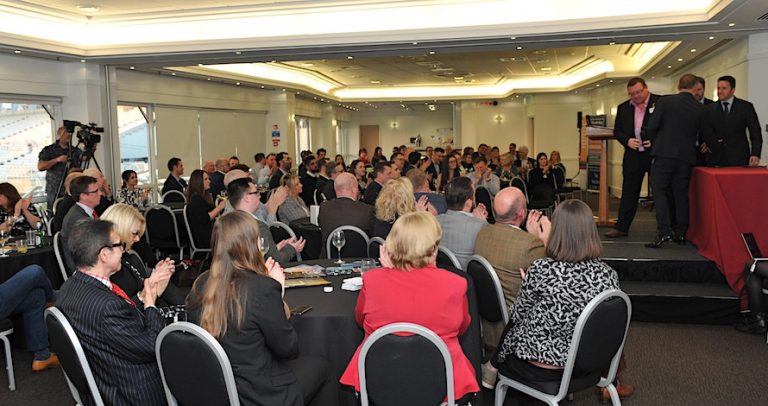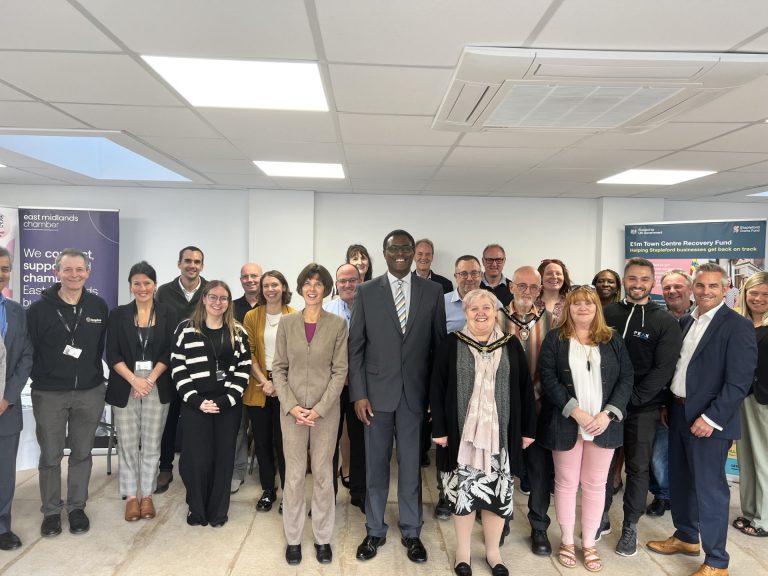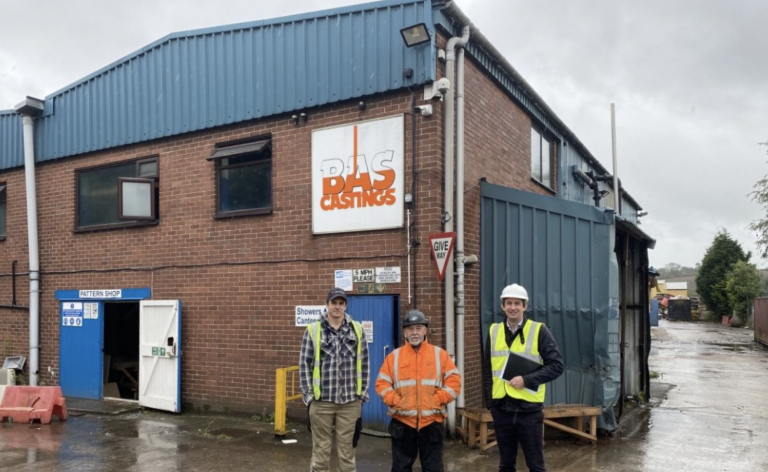New business support service for Hinckley and Bosworth
Staveley town centre regeneration plans released
Revised proposals for the multi-million-pound regeneration of Staveley town centre have been released by Chesterfield Borough Council, following Government approval to allocate additional funding to the project.
The six-million-pound Staveley 21 project has been in development over the last year following publication of the Staveley Town Centre Vision Masterplan which received strong public support in November 2021.
The proposals – which are funded through the Staveley Town Deal – were shared at a meeting of Staveley Town Council on Tuesday night.
Councillor Kate Sarvent, Chesterfield Borough Council’s cabinet member for town centres and visitor economy, said: “We know everyone has been keen to see the council’s proposals for Staveley town centre and I’m delighted that we are now able to share these. As a package the proposals seek to enhance the town centre – opening it up for new uses that will encourage more people to visit whilst also supporting existing retailers, market traders and high street businesses.”
A range of visuals have been prepared to bring the proposals to life with a particular focus on the new pavilion building and how the marketplace will look and could be used by different audiences.
The new pavilion building sits between the Staveley Miners Welfare building and Staveley High Street. Of modern design but one that is also reflective of Staveley’s heritage, the building will form a striking new focal point in the heart of the town centre. Several uses for the building are currently being considered including as a potential site for Derbyshire County Council’s relocation of Staveley library and also for retail, leisure, and business start-up uses.
As an enlarged public open space, the marketplace will be designed as a flexible environment to support existing uses such as Staveley Town Council’s regular markets but also as a setting that can be used to host a wide range of new events to encourage more people to visit the town centre.
Tiered outdoor seating will be introduced to support outdoor theatre and open-air cinema screenings, and play equipment installed to help make the marketplace more attractive to families.
New paving, lighting, street furniture and planting will help create an enhanced atmosphere and visitor experience at any time of day or night whilst new signage will help connect the town centre with Staveley’s other visitor attractions including the Chesterfield Canal and Staveley Hall.

Councillor Kate Sarvent, Chesterfield Borough Council’s cabinet member for town centres and visitor economy, continued: “Town centres across the country are changing and our proposals reflect this need to adapt. We have already secured a main contractor to deliver the project and our aim is to achieve planning permission in Spring 2024. In line with the Government’s requirements, we plan to be on site in Autumn 2024 and for all of the construction work to have been completed by the end of 2025.
“Ahead of this, we are committed to carrying out extensive engagement on the proposals to ensure that we capture the views of all stakeholders and make appropriate adjustments ahead of submitting the necessary planning application.
“We’re also still seeking applications for the shop front grant scheme which we launched in February. A total sum of £600k is available to support shop owners and landlords to make improvements to their premises.”
Ivan Fomin, chair of the Staveley Town Deal Board, said: “The delivery of the Staveley 21 project is a big first step towards realising the Staveley Town Centre Vision Masterplan which received strong public support in November 2021.
“It’s exciting to see Chesterfield Borough Council move the project forward into this next phase, which reflects the Staveley Town Deal Board’s vision and ambition for Staveley town centre.
“These are significant proposals which will ensure Staveley town centre is a place where local people and visitors will want to spend time whilst also supporting local businesses to grow not only now but in the future.”

Free eco scheme to help local fleet operators
Local schools join Derby engineering firm for National Manufacturing Day
Property professionals will gather tonight for the East Midlands Bricks Awards 2023!
Shortlist for the East Midlands Bricks Awards 2023
Most Active Estate Agent – sponsored by OMS
BB&J Commercial
Mather Jamie
FHP Commercial Development of the Year – sponsored by MKMHBD – Power Park, Nottingham
Henry Brothers Construction – SportPark Pavilion 4, Loughborough
Bolsterstone Group Plc, Chesterfield Borough Council – One Waterside Place, Chesterfield Responsible Business of the Year – sponsored by Press for Attention PR Cawarden G F Tomlinson Aspbury Planning Limited Residential Development of the Year – sponsored by Sterling Commercial FinancePhoenix Brickwork UK Ltd – St Marks student accommodation, Lincoln
Elms Developments – Elms Phase Two Ltd
St James Securities, Grainger – The Condor, Derby
Deal of the Year – sponsored by Mather JamieRushton Hickman Limited – Branston Locks deal
Bassi Group Nottingham Ltd – Job saving Pizza Hut takeover
Rigby & Co – Aida Factory deal
Developer of the Year – sponsored by WardChevin Homes
Clowes Developments
Brackley Property Developments
Architects of the Year – sponsored by Blueprint InteriorsIMA Architects
Matthew Montague Architects
Influence Landscape Planning and Design
Excellence in Design – sponsored by CawardenChevin Homes – Amber Farm
Marchini Curran Associates – Phoenix cinema and art centre
Trident Construction Services – Lark Hill Retirement Village refurbishment
Sustainable Development of the Year – sponsored by Viridis Building Services LtdHBD – Power Park, Nottingham
Henry Brothers Construction – SportPark Pavilion 4, Loughborough
Elms Developments – Elms Phase Two ltd
Contractor of the Year – sponsored by RammSanderson CawardenEE Smith Contracts
Bowmer + Kirkland
The Overall Winner, sponsored by Streets Chartered Accountants, will also be announced at the ceremony, who will be awarded a year of marketing/publicity worth £20,000.










 To be held at:
To be held at:

McLaren Construction appointed on £8bn Procure Partnerships Framework
McLaren Construction (Midlands and North) has been appointed to two of the four lots awarded to McLaren nationally on the £8bn Procure Partnerships Framework.
Procure Partnerships Framework has operated a national contractor framework for the last four years across 11 regions, and this second iteration covers four disciplines; construction, decarbonisation and retrofit, demolition and site preparation and infrastructure.
Under the construction discipline, the McLaren Construction (Midlands and North) division has been appointed to deliver public sector projects from £15m-£30m in the East Midlands and £30m+ in the West Midlands.
The contractor is one of 87 appointed to the second-generation Framework which will run from 1 November 2023 for four years.
McLaren Construction (Midlands & North) secured its place on the Framework through a rigorous selection process encompassing several critical assessments, including: PAS91 Selection Questionnaire, Financial Standing Checks, Relevant Experience, and Commercial Assessments, alongside Quality Assessments – covering aspects such as cost management, health and safety, sustainability, social value, and performance management.
Gary Cramp, Managing Director at McLaren Construction (Midlands & North), said: “The new iteration of the framework is set to transform public and private sector procurement. McLaren Construction is proud to have been selected to deliver high-quality public sector schemes.
“Both McLaren Construction and the Framework have a shared priority of delivering projects that have a strong emphasis on generating social value, and we are looking forward to what will be achieved for communities in the next four years.”
Robbie Blackhurst, Director and Founder at Procure Partnerships Framework, said: “It was of paramount importance to us that the new framework addresses the growing needs of the industry, whilst ensuring clients have access to specialist contractors for their projects.
“McLaren Construction has an extensive portfolio of delivering successful construction projects, and we’re delighted to welcome them back onto the second iteration of the Procure Partnerships Framework.”
McLaren Construction London and South have also been appointed to two lots covering £30m+projects in the East of England and Southeast.
£1m high street revitalisation celebrated by Stapleford businesses
Local business owners are celebrating the success of a £1m grant scheme that has transformed Stapleford’s high street.
Through the £21m Government-funded Stapleford Towns Fund, 75 businesses have received a share of a £1m Town Centre Recovery Fund pot aimed at regenerating and revitalising the high street after the economic downturn of the pandemic.
Beneficiaries include Peak My Body fitness centre, Sewing Bee, Wake Cup Café, Millepede micropub, Larry’s Bar, Rowells, Gurkha Nights, Affinity Dance School and Little Driver’s Play Centre.
Grants have enabled external building and signage work to many businesses to modernise their premises and improve the look of the high street, as well as internal decoration, accessibility and energy efficiency improvements, equipment, furniture and marketing.
Business owners came together at the first of a series of business networking events on Monday night (25 September) to share their achievements and network with each other and business experts from East Midlands Chamber, Nottinghamshire County Council and Broxtowe Borough Council.
Paul Sweeney, Vice Chair of the Stapleford Towns Fund Board, said: “Stapleford is a fantastic town with so much potential. This £1m fund was designed to boost the long-term prosperity of the high street and these grants, many co-funded by business owners, have not only made the town more visually appealing to residents, shoppers and investors, they’ve improved things like energy efficiency, accessibility and marketing, that will have a long-term impact too.”
Mike Millers of Peak My Body, has benefitted from the grant and the Stapleford gym has been open to everyone who wants to improve their fitness, including a GB American football athlete and an up and coming teen boxer from the town.
Mike said: “The business grant has helped grow membership of the gym and install app access for members so they can come to the gym around their own schedules. It would have taken eight to 12 months to do this on my own, the scheme has been fantastic.”
Darren Henry, MP for Broxtowe and Stapleford Towns Fund Board Member, said: “It was fantastic to meet so many local business owners and hear about the huge impact these grants have had on their businesses. Stapleford has a great community spirit which was very much evident at this networking event and I have no doubt that Stapleford has a prosperous future ahead.”












